I’ve always liked stories about gods. Like many nerdy children who subsequently became SFF fans, I went through periods of obsessive interest in Greek, Roman, Norse and Egyptian mythology and their respective pantheons.
And why not? Gods are basically superheroes without the capes. They are larger than life, have supernatural powers and use cool weapons, but they’re also petty AF and constantly up to something. Some of them have even acquired the capes, as we who live in this post-Marvel Cinematic Universe world cannot escape knowing.
As with superheroes, the writing in tales of the gods is often unsatisfactory, the gender dynamics wack, the continuity hopelessly tangled. Yet their appeal persists.
I grew up around other gods as well. The big-G Gods, of Christianity and Islam, are not my concern; I speak here of pantheons, the kind whose adventures would make (and have made) good TV series. There were the Taoist gods, like Ti Kong (often referred to in English as the Jade Emperor), whom we prayed to on the ninth day of every Lunar New Year. There were Siddhartha Gautama and all the other Buddhas, who, strictly speaking, did not claim godhood, but who got incense and offerings and public holidays like the other gods. Even the Hindu gods had cameos at the temples my family visited each Wesak Day.
I never got quite as nerdy about the Chinese gods as I did about Zeus and Odin and Osiris, though, even when the whole family got obsessed with the ’90s TVB TV adaptation of the classic Chinese novel Journey to the West. In Journey to the West, the Monkey King Sun Wukong sets the Taoist Heaven by its ears and is obliged to escort the hapless monk Tripitaka on his journey West to obtain Buddhist sutras.
Monkey is a popular trickster figure, given to relatable antics like throwing a massive tantrum when he realises he’s been passed over for a promotion, bingeing on immortality-granting peaches, and pissing on the Buddha’s fingers. In Southeast Asia, he is also known as Tai Seng Ia and has various temples devoted to him. He is known, as a god, for his efficacy in exorcising demons.
I liked Monkey and the Goddess of Mercy, Guanyin, who watches over him in a similar way to how Athena hovers over Odysseus, giving him divine aid and advice. But your own gods are a different matter from the superhero-like characters in books about the Greek and Norse pantheons, whose temples have long fallen into dust. They’re closer, scarier, more mysterious, more real. Part of the reason for Guanyin’s popularity as a deity is probably because she’s the one Chinese god who, you feel, wouldn’t hold a grudge.
When I write about the Chinese gods, as in my Malaysia-set contemporary fantasy Black Water Sister, there are at least two sets of stakeholders I worry about: (1) people practising a living religious tradition, including my relatives, and (2) the gods who are the object of that worship.
Buy the Book
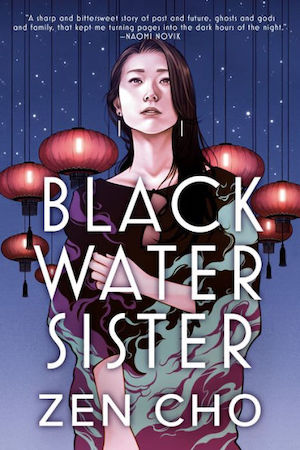

Black Water Sister
Creating stories inspired by religious beliefs and practices that are so obscure in the Anglophone world is a delicate matter. All I can do is try to capture some of the complexity of things as they are – to seek to write books that remind readers the world is wider than any of us knows, more full of wonders and perils. After all, what else is fantasy for?
If you, like me, would like more pantheons in your SFF, check out the books below.
The Palace of Illusions by Chitra Banerjee Divakaruni
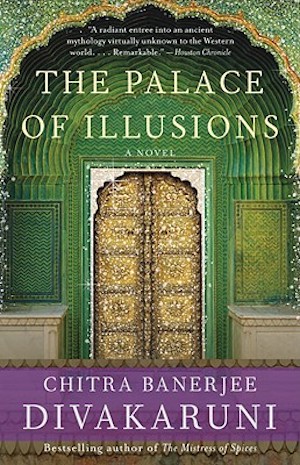
A feminist reimagining of the Indian epic Mahabharata from the point of view of Panchaali, wife of the five Pandava brothers. The book traces Panchaali’s life from her birth in fire to her marriage with the five brothers, which takes her from queenhood to a long exile, and finally, into a catastrophic war. I read this before encountering any other retelling of the Mahabharata: it’s an accessible, entertaining and moving introduction to one of humanity’s great stories.
Circe by Madeline Miller
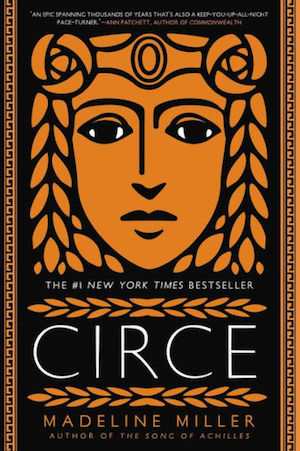
In a similar vein to The Palace of Illusions, Circe is hardly obscure, but a highly enjoyable take on a lesser female member of the Greek pantheon. Daughter of the god of the sun, Circe starts off a vulnerable, bullied girl in a court of divine dickheads, but when she encounters the mortal world, she comes into her powers as a witch. It’s always challenging to ground stories of supernatural beings unless you give them sufficient limitations; Miller brings to Circe a vivid interiority that roots this narrative of gods and heroes in one woman’s experience.
Small Gods by Terry Pratchett
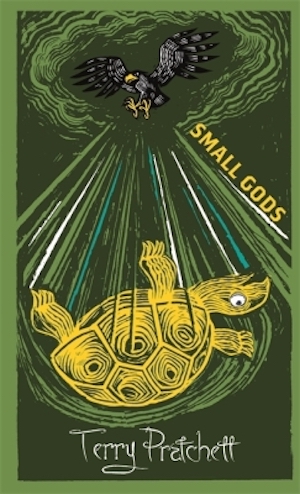
In my view, the best Discworld standalone, Small Gods follows the Great God Om, who has accidentally manifested himself as a tortoise, and his prophet Brutha. It may be about gods and tortoises and prophets, but like all of Pratchett’s best books, it’s ultimately a story about the best and worst of humanity.
The Hundred Thousand Kingdoms by N. K. Jemisin
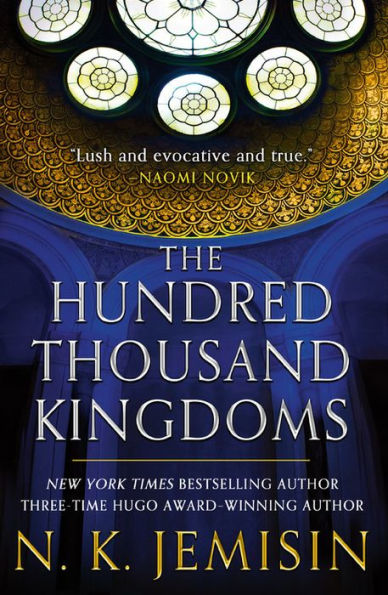
I always think of Jemisin’s debut novel as an anime in novel form, with its sexy dangerous captive gods and no-holds-barred worldbuilding. Summoned to the floating city of Sky by her grandfather, ruler of the world, Yeine Darr is drawn into a power struggle with her estranged relatives to inherit the throne. To survive, she needs to deal, too, with the gods whom her family have enslaved as living weapons. Features the best pantheon to play shag/marry/kill with.
Freshwater by Akwaeke Emezi

Ada is an ọgbanje, a spirit child who constantly dies and is reborn to plague the same family. As she grows into adulthood, the gods teeming within her multiply and grow stronger, until a traumatic event gives them a new power, reshaping Ada. One way of summarising Freshwater is as a depiction of a young persons difficult coming of age as viewed through the lens of Igbo spirituality—but it’s a hard book to describe. Read it to hear the voices of gods and spirits, familiar and unfamiliar.
Daughter of the Moon Goddess by Sue Lynn Tan
Due out in early 2022, this fantasy by a Hong Kong-based Chinese Malaysian author follows the adventures of the daughter of the moon goddess Chang E in the realm of immortals. I haven’t read it yet, but am really looking forward to exploring this take on one of the best-known Chinese gods.
Zen Cho is the author of the Sorcerer to the Crown novels, Black Water Sister and various shorter fiction. She is a Hugo, Crawford and British Fantasy Award winner, and a finalist for the Lambda, Locus and Astounding Awards. She was born in Malaysia and lives in the UK.










